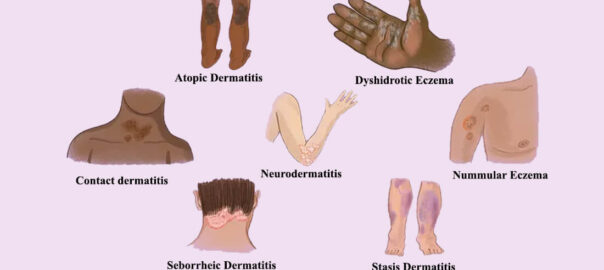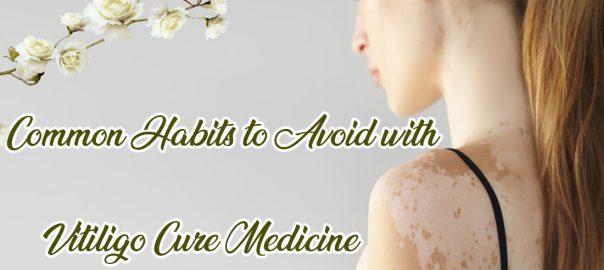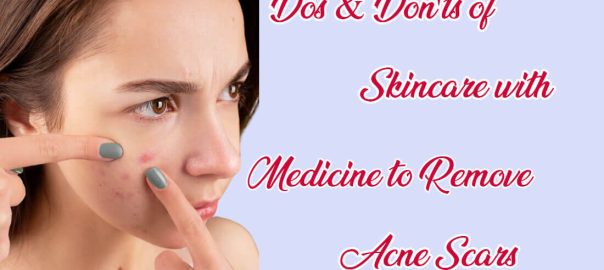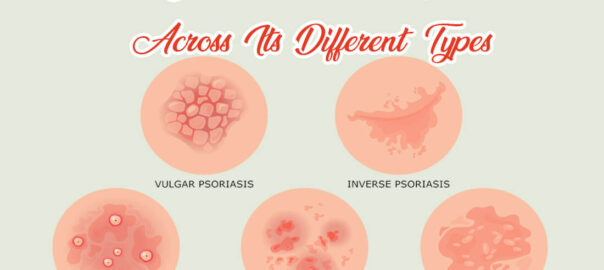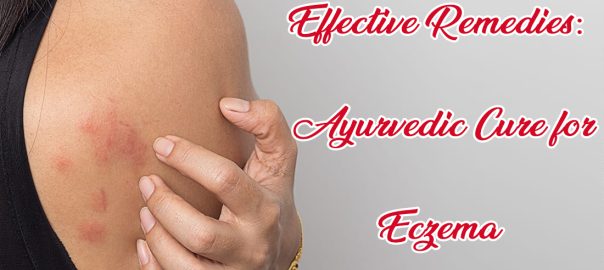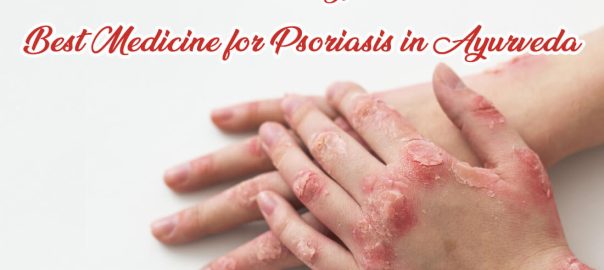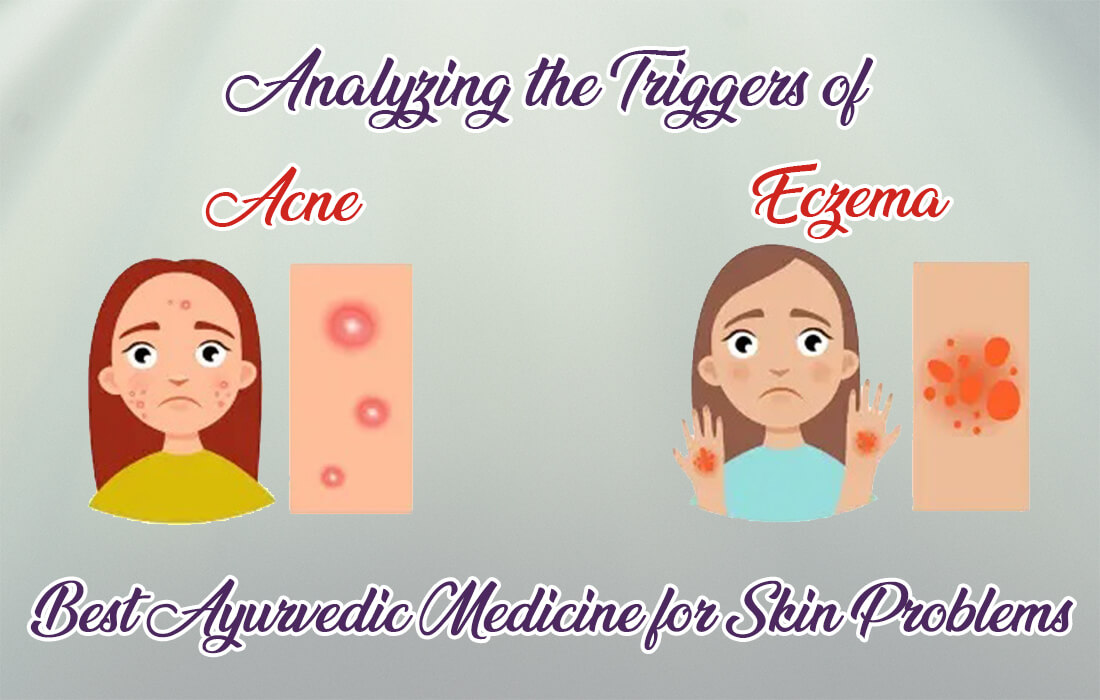
Acne and eczema are common skin issues that bother people of all ages. They can make you uncomfortable and self-conscious, even lowering your confidence. Many treatments exist, but knowing why they happen is key. This article looks at what causes acne and eczema, like genes, hormones, diet, stress, and environment. By understanding the following causes of these skin conditions, along with the best ayurvedic medicine for skin problems, we can take steps to reduce their impact on our lives and achieve clearer, healthier skin.
Understanding Acne and Eczema for Skin Concern
Acne and eczema are common skin problems for people of all ages. Eczema shows as dry, itchy, and red skin that can be uncomfortable. Acne involves different kinds of bumps like blackheads and pimples, often in oily areas. These issues happen due to things like genes, hormones, stress, and things in the environment. Even though they look different, both have inflammation.
Triggers such as allergens, irritants, changes in weather, and stress can worsen the symptoms. Eczema often develops due to dysfunction in the immune system and a compromised skin barrier function. Fortunately, there are various methods to alleviate symptoms and manage the condition. These may include topical creams, the best ayurvedic medicine for eczema, and lifestyle modifications such as avoiding triggers and maintaining a healthy diet.
Causes of Acne:
While the causes of acne and eczema can vary, let’s consider some typical factors linked to each condition:
- Excess Sebum Production: An increase in the functioning of oil glands can cause them to produce excess sebum, potentially leading to pore blockages and the onset of acne outbreaks.
- Bacterial Infection: These infection contributes to acne, particularly due to the presence of propionibacterium acnes.
- Hormonal Changes: Fluctuations in hormone levels, particularly during puberty, menstruation, or hormonal disorders, can trigger acne.
- Clogged Hair Follicles: When dead skin cells, sebum, and bacteria accumulate in hair follicles, it can lead to blockages and the formation of acne.
Causes of Eczema:
- Genetics: A family history of eczema or atopic conditions like asthma or hay fever increases the risk of developing eczema.
- Abnormal Immune Response: Eczema links to an overactive immune system that excessively responds to triggers, resulting in inflammation and skin irritation.
- Skin Barrier Dysfunction: An impaired skin concern makes it simpler for irritants and allergens to infiltrate the skin, potentially causing eczema flare-ups.
- Environmental Factors: The presence of particular irritants, such as potent chemicals, detergents, or airborne allergens, can amplify the manifestations of eczema.
- Dry Skin: Individuals with dry skin are at a higher risk of developing eczema due to their deficiency in natural moisture and protective oils required to uphold a robust skin barrier.
- Stress: Emotional stress can worsen eczema symptoms in some individuals, although it may not be a direct cause.
Symptoms of Acne:
When exploring the root causes of acne and eczema, addressing the symptoms is important. Treatment for both conditions includes avoiding irritants, keeping the skin clean, and using moisturizers. Here are the following symptoms for acne and eczema
- Pimples: Acne typically presents as pimples which can be whiteheads (closed clogged pores), blackheads (open clogged pores) or red bumps.
- Comedones are non-inflammatory acne lesions that appear as small bumps on the skin’s surface.
- Papules and pustules: Inflammatory acne lesions that are red, swollen, and may contain pus.
- Cysts and nodules: Severe forms of acne that are deep, painful, and can leave scars.
- Oily Skin: Excess oil production can contribute to the development of acne.
- Skin Sensitivity: Acne-prone skin may be more sensitive and prone to irritation or redness.
Symptoms of Eczema:
- Dry, Itchy Skin: Eczema is characterized by dry, rough, and scaly skin patches often accompanied by intense itching.
- Redness and Inflammation: Affected areas of the skin may appear red, swollen, and inflamed.
- Rash: Eczema can cause an inflammation that may be raised, bumpy, or have a blister-like appearance.
- Cracking and Peeling: In severe cases, the skin may crack, peel, or develop small fissures.
- Weeping or Oozing: Eczema can lead to the formation of small blisters that may ooze fluid.
- Thickened Skin: Repeated scratching or irritation can cause the affected skin to thicken.
How to deal with symptoms of Acne & Eczema : Ayurvedic Medicine for Skin Allergies
Here are some ways to deal with the symptoms of acne and eczema:
- Follow a Gentle Skincare Routine: Use mild, fragrance-free cleansers and moisturizers suitable for sensitive skin. Avoid harsh scrubbing or excessive washing, it can lead to skin irritation.
- Avoid Triggers: Identify and avoid any triggers that worsen your symptoms, such as certain foods, stress, or allergens. Keep a diary to track potential triggers and adjust your lifestyle accordingly.
- Moisturise Regularly: Apply moisturizers to keep your skin hydrated and prevent dryness. Choose items that are formulated specifically for individuals with sensitive or eczema-prone skin.
- Use Topical Treatments: For acne, creams, the best ayurvedic medicine for acne scars can help reduce inflammation and control breakouts.
- Avoid Scratching: Itchiness is a frequent symptom; however, scratching can escalate inflammation and create a pathway for potential infection. Keep your nails short, and consider using anti-itch creams or cold compresses to soothe the skin.
- Ensure skin safety: Use SPF sunscreen to protect against UV rays, diminishing the risk of acne and eczema development. Also, wear protective clothing to minimize exposure to irritants and potential triggers.
Signs that Your Diet May be Contributing to Your Skin Issues:
- Acne Breakouts: Detecting patterns between your diet and constant breakouts indicates that what you eat affects skin problems.
- Increased Inflammation: Skin problems like eczema can be heightened by inflammatory foods like processed treats, sugary snacks, and high-fat meals.
- Digestive Problems: Skin issues can sometimes be a reflection of gut health. Digestive issues like bloating, gas, or constipation could imply that your diet has an impact on the skin health.
- Skin Sensitivity: Certain foods or ingredients may trigger allergic reactions or sensitivities, leading to skin rashes, redness, or itching.
- Dull or Uneven Complexion: Insufficient essential nutrients (vitamins, minerals, antioxidants) can cause dull, uneven skin tone, and an unappealing complexion.
- Excessive Oiliness or Dryness: Imbalance affects skin’s oil regulation, causing excessive oiliness or dryness due to dietary factors.
- Delayed Wound Healing: Inadequate nutrient intake through diet can result in delayed recovery of cuts, bruises, and acne-related scars.
Conclusion:
Acne and eczema are intricate skin disorders influenced by many factors, ranging from genetic predisposition to the habits and choices we incorporate into our daily routines. While they have different root causes, they can share common triggers and require a holistic approach to management. Maintaining healthy skin requires us to pay attention to our diet as well. A balanced dietary approach may be a more sustainable and natural solution and can significantly improve our overall skin health. By avoiding trigger foods and incorporating skin-friendly options into our meals, along with the ayurvedic medicine for skin problems, one can achieve a clear, healthy complexion that radiates from the inside out. So, let’s start caring for ourselves to achieve clear and radiant skin.

